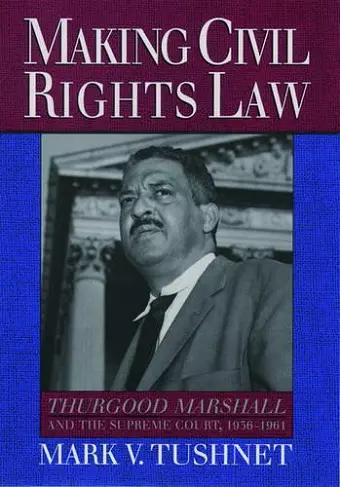Making Civil Rights Law
Thurgood Marshall and the Supreme Court, 1936-1961
Format:Paperback
Publisher:Oxford University Press Inc
Published:13th Jun '96
Currently unavailable, currently targeted to be due back around 19th September 2025, but could change
This paperback is available in another edition too:
- Hardback£122.50(9780195084122)

Winner of an American Bar Association Gavel Awards Certificate of Merit
This guide to civil rights law is of interest to students and scholars of American legal history and the history of the civil rights movement in the United States.From the 1930s to the early 1960s civil rights law was made primarily through constitutional litigation. Before Rosa Parks could ignite a Montgomery Bus Boycott, the Supreme Court had to strike down the Alabama law which made segregated bus service required by law; before Martin Luther King could march on Selma to register voters, the Supreme Court had to find unconstitutional the Southern Democratic Party's exclusion of African-Americans; and before the March on Washington and the Civil Rights Act of 1964, the Supreme Court had to strike down the laws allowing for the segregation of public graduate schools, colleges, high schools, and grade schools. Making Civil Rights Law provides a chronological narrative history of the legal struggle, led by Thurgood Marshall and the NAACP Legal Defense Fund, that preceded the political battles for civil rights. Drawing on interviews with Thurgood Marshall and other NAACP lawyers, as well as new information about the private deliberations of the Supreme Court, Tushnet tells the dramatic story of how the NAACP Legal Defense Fund led the Court to use the Constitution as an instrument of liberty and justice for all African-Americans. He also offers new insights into how the justices argued among themselves about the historic changes they were to make in American society. Making Civil Rights Law provides an overall picture of the forces involved in civil rights litigation, bringing clarity to the legal reasoning that animated this "Constitutional revolution", and showing how the slow development of doctrine and precedent reflected the overall legal strategy of Thurgood Marshall and the NAACP.
"Supreme Court history at its best. In a volume rich with documentation that is copious, appropriate, and helpful, few sources seem to have been overlooked."--Journal of Supreme Court History
"A monumental and fascinating piece of research written in language that you too can understand."--Nina Totenberg, Legal Affairs Correspondent, National Public Radio and ABC Nightline
"Dramatic and moving....Replete with new information and insights about Marshall and his times....The Marshall that rises from the pages of this book was a brilliant lawyer, a shrewd strategist and a prodigious psychologist."--Chicago Tribune
"Superb documentation, including interviews, letters, and manuscript collections."--Choice
"An absorbing account of the legal struggles, led by Thurgood Marshall, to achieve civil rights for African Americans....An important and well-told account of the often-neglected legal struggle for civil rights."--Kirkus Reviews
"This is a sobering, serious, historically significant work that should be read by every law student, lawyer and judge in America. Journalists, educators and other persons who shape public policy, will gain insights of inestimable value. Moreover, as South Africa and other nations struggle to insert human rights and and civil rights values into their domestic laws, the lessons to be learned from Thurgood Marshall, as chronicled in this remarkable book, assume even greater importance."--Nathaniel R. Jones, Circuit Judge, United States Court of Appeals for the Sixth Circuit
"This is the definitive account of the legal crusade that triggered a social revolution. Thurgood Marshall's skills as an advocate are detailed with care and insight. Had he never held public office, he would have been one of the most important lawyers in American history, and Mark Tushnet's book demonstrates why."--Dennis J. Hutchinson, Editor, The Supreme Court Review, The University of Chicago
"Mark Tushnet's wonderful book makes possible a full accounting of the enormous debt we owe to Thurgood Marshall. By telling the compelling story of Marshall the civil rights lawyer, Tushnet's book reminds us that Thurgood Marshall would have been a giant if he had never served a day on the Court. For students of the Court, Tushnet provides an invaluable insight into the NAACP legal strategy that led to a constitutional revolution."--Burt Neuborne, New York University School of Law
"A superb book. Based on careful excavation of the archival record, Tushnet focuses on Marshall's career as the guiding presence of the NAACP Legal Defense Fund. Tushnet evokes the often harrowing circumstances under which Marshall worked and makes clear the true heroism of his achievement as a lawyer who truly was, at the same time, a primary maker of our civil rights law. Along the way, Tushnet also offers a first-rate history of the Supreme Court's confrontation with the legal problems posed by the discriminatory regime that Marshall devoted his life to attacking."--Sanford Levinson, University of Texas School of Law at Austin
"Extraordinarily valuable for its account of the deliberations of the Supreme Court in the vital cases brought to it by Thurgood Marshall. All readers will gain important insights into the workings of the Court and how it was influenced by the strategic decisions made by Marshall and his colleagues at the NAACP Legal Defense Fund."--Charles Stephen Ralston, Senior Staff Attorney, NAACP Legal Defense and Educational Fund, Inc.
"Detailed and nuanced."--Publisher's Weekly
- Winner of Winner of an American Bar Association Gavel Awards Certificate of Merit.
ISBN: 9780195104684
Dimensions: 234mm x 155mm x 30mm
Weight: 572g
416 pages